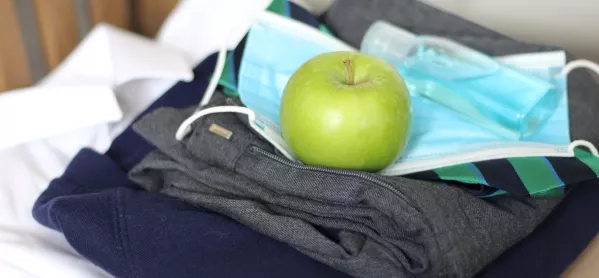- Home
- Call to end monopolies on school uniform supply
Call to end monopolies on school uniform supply

New research has found that almost a fifth of secondaries specify an exclusive supplier for school uniform, despite this pushing up costs and putting pressure on low-income families.
It has been found that the coronavirus pandemic has led to an additional 200,000 children in relative poverty.
Yet research by the University of Aberdeen has found that 70 of Scotland’s 357 state secondary schools continue to specify where uniform should be purchased, and that two-thirds of secondary school uniforms include a blazer.
Background: Elaborate uniforms are pricing out poor pupils, schools told
News: ‘The Rees-Moggs’ school uniform? Cravats are modern’
Opinion: Is it time to abandon the anachronistic school blazer?
In England: Government backs bill to cut cost of school uniforms
A more affordable approach would be for schools to get rid of bespoke items, such as blazers and ties, and to replace them with “everyday items” - such as jumpers or trousers of a certain colour, said Dr Rachel Shanks, the senior lecturer in the university’s school of education, who led the research.
She said a bill going through the UK Parliament was seeking to prevent schools from forcing parents to buy uniforms from a single supplier, and that Wales already had statutory guidance that was “against exclusive supplier arrangements” and high cost items like blazers.
She said that statutory guidance should be developed in Scotland, with affordability the top priority, and that the guidance should require “regular reviews of exclusive supply arrangements of school uniform items in order to reduce the cost of the school uniform”.
Dr Shanks, who presented her findings as part of the Explorathon ‘20 festival celebrating Scottish research, also called for pupils to be involved in decision making when it came to school uniform and dress code policies.
She said: “It’s really thinking about, do we need those expensive items like blazers and ties? And could we go to more generic items, as they are moving to in Wales, where maybe there’s a colour - a colour for jumpers, a colour for trousers. And do we need to ban things like trainers?
“So, it’s really, could more everyday items be the school uniform?”
Sara Spencer, who leads Child Poverty Action Group in Scotland’s scheme to reduce the cost of the school day, said that one secondary school had managed to reduce the cost of its blazer by £60 just by changing supplier.
She argued that it was possible for schools to include items such as blazers in their uniforms but the key was to keep affordability front and centre, and to consult with parents and pupils on uniform policies.
At Port Glasgow High School, in Inverclyde, the vast majority of senior pupils hire a blazer for just £5, as opposed to buying one.
In Scotland, there is a minimum school clothing grant of £100 for low-income families. The University of Aberdeen researchers found nine authorities provided families with more than this, with one council providing £145.
However, while government guidance indicates that the clothing grant should be awarded automatically when other benefits are applied, this only happened in six councils, the researchers found. And government guidance designed to ensure that clothing grants should automatically roll over to the following school year - to save families having to reapply - was only followed in nine councils.
Just one council followed both government recommendations.
Register with Tes and you can read two free articles every month plus you'll have access to our range of award-winning newsletters.
Keep reading with our special offer!
You’ve reached your limit of free articles this month.
- Unlimited access to all Tes magazine content
- Save your favourite articles and gift them to your colleagues
- Exclusive subscriber-only stories
- Over 200,000 archived articles
- Unlimited access to all Tes magazine content
- Save your favourite articles and gift them to your colleagues
- Exclusive subscriber-only stories
- Over 200,000 archived articles



